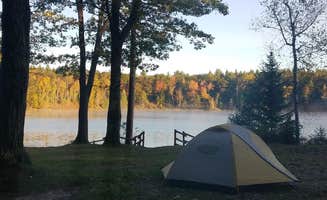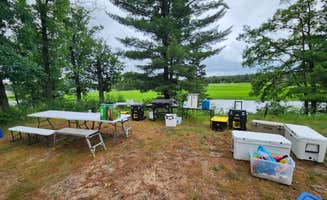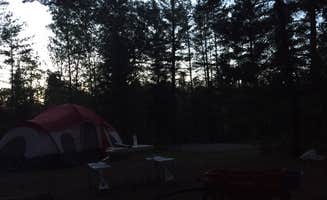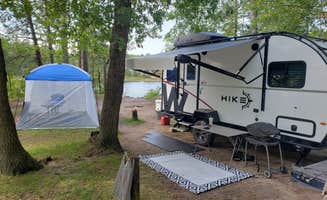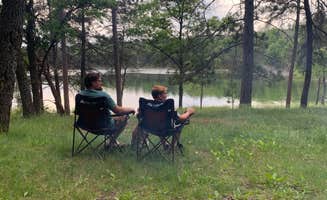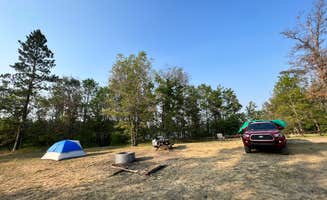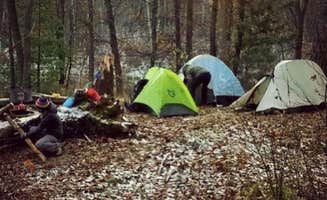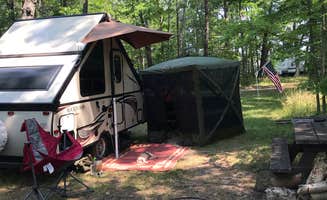Dispersed camping near Mio, Michigan exists primarily on surrounding national forest land, with elevation changes of 100-300 feet providing varied terrain. The area sits at approximately 1,000 feet above sea level within the Huron-Manistee National Forests, where sandy soil conditions influence site drainage. Camping options include boat-in only sites along the AuSable River ponds, where motorized boat traffic occasionally disrupts the wilderness experience during summer months.
What to do
Kayaking the river system: Pack essential gear for day trips on the AuSable River from sites at Au Sable River Primitive Camping. "We went kayaking for a full day and loved it! There is no potable water so bring a filter, no toilets so bring a shovel, and it is pack-in pack-out," reports James D.
Fishing opportunities: Access productive fishing spots directly from riverfront sites. "Fishing was excellent. Sunsets and sunrises were great. Our site had lots of shade and space," notes Sam W. about the Cooke Dam Pond area. Fish species include bluegill, sunfish, and bass throughout the connected waterways.
Hiking forest trails: Explore marked pathways in the surrounding forests with access points near most campgrounds. "We hiked all through the forest, tried lots of cool gear and discovered a new love for camping and nature," shares Agapes D. about their experience in the Huron-Manistee National Forest.
What campers like
Island campsites: Find secluded spots on small islands within the river system. "The islands (site 41c specifically) are the best spots - there's very little reason to worry about critters when you're on an island," recommends Don H. about Au Sable River Primitive Camping.
Fall color viewing: Experience peak autumn foliage typically from late September through mid-October. "We visited this campsite for a long weekend in October, looking for that autumn experience. Our site was right on the lake, and had a great view of the river and the trees changing," explains Michael G.
Wildlife observation: Watch for native animals from your campsite, particularly during morning and evening hours. "We were fortunate enough to see mink, beaver, muskrat, loons, eagle, osprey and three swan...so it was a treasure trove for us," shares Dave V. about the Devoe Lake Rustic Campground area.
What you should know
Water access considerations: Evaluate the terrain between campsites and water before booking. "Our site was situated with a fairly steep slope to the river which was challenging but not impossible," notes James D. about Au Sable River sites. Some sites require navigating significant elevation changes to reach water.
Cell service reliability: Coverage varies significantly across the camping areas. "Verizon = 3-4 bars 5G," reports Jonathan B. about specific sites along the river corridor, while other locations may have minimal signal strength.
Noise factors: Several campgrounds experience periodic sound disruptions. "During the day and sometimes at night you can hear a lot of road traffic and also jet engine noise from the local airport," warns Jonathan B. about sites near Oscoda.
Bathroom facilities: Toilet options range from none to basic depending on location. "There are vault toilets. A dumpster. Functioning potable water pump," lists Sean G. about the facilities at Parmalee Bridge State Forest Campground.
Tips for camping with families
Water safety planning: Assess site drop-offs when camping with young children. "It was a bit stressful as our site had a significant drop off to the river below. This meant we were constantly chasing our crazy kid to ensure he didn't take a tumble down," cautions Sam W. Choose alternative sites with gradual slopes when traveling with toddlers.
Kid-friendly activities: Take advantage of playgrounds at developed campgrounds. "Hiking trails and a playground for the kids," mentions Becky K. about amenities at Alcona Park.
Site selection for groups: Look for larger clearings when camping with multiple families. "Our site had room for 3 families with tents," notes Kortney P. about the Au Sable Loop sites, indicating sufficient space for group camping.
Tips from RVers
Power considerations: Prepare for limited electrical options at most sites. "They have 50 or 20 amp power, so you will need a 15 or 50 adapter to use 30 amp service," advises Gordon B. about Oscoda County Park.
Site sizing: Confirm measurements before booking RV sites. "Sites are very large, especially for tent camping, and that seemed to be the trend. Others were camping with campers and tents, but there was pretty of room to spread out," reports Michael G. about certain river sites.
Water fill stations: Plan water needs around available fill points. "No water at camp sites, but they have a water fill station," notes Gordon B., highlighting the need to arrive with tanks filled or locate the designated water access points.



